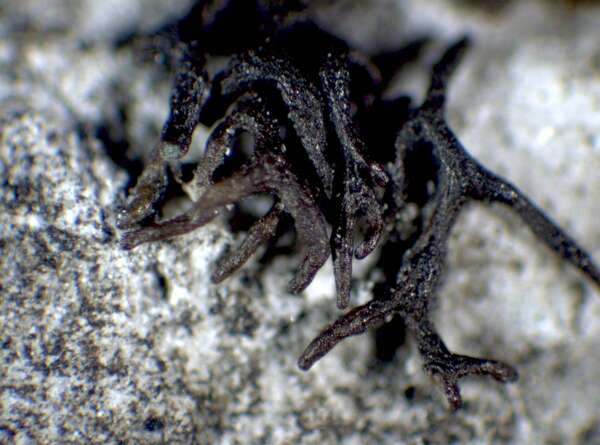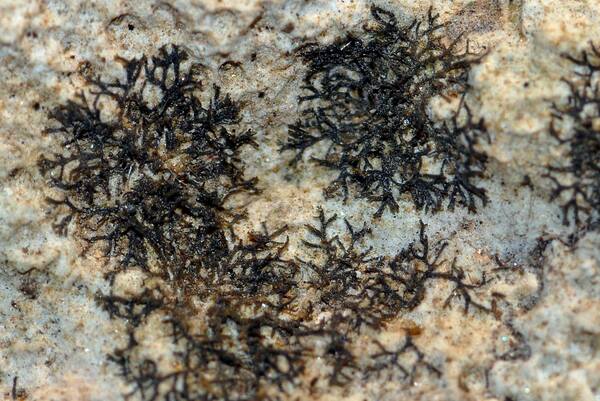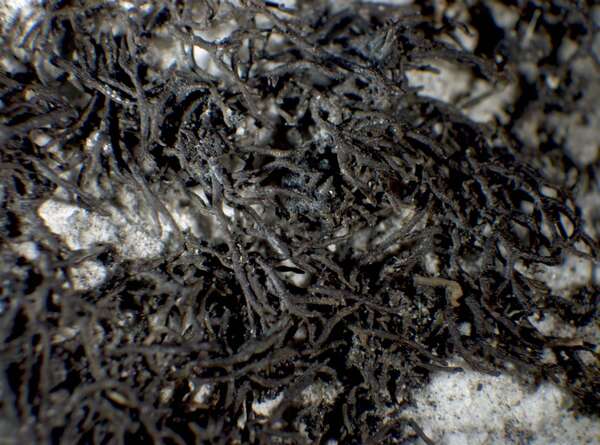Scytinium massiliense (Nyl.) Otálora, P.M. Jørg. & Wedin
Fungal Divers., 64, 1: 291, 2013. Basionym: Leptogium massiliense Nyl. - Flora, 62: 354, 1879.
Synonyms:
Description: Thallus subfruticose, subgelatinous when wet, forming up to 1(-2) cm wide, 1-4 mm thick, rather loosely attached cushions, the lobes at first flattened, prostrate and irregularly spreading, up to 0.3 mm wide, then ascending and terete-filamentous, c. 3(-4) x 0.1-0.2 mm, dichotomously branched, brown to brown-black, somehow glossy, smooth or rarely longitudinally wrinkled, sometimes with isidia-like outgrowths. Upper and lower pseudocortex formed by regular layers of angular cells, the layer inbetween not paraplectenchymatous. Apothecia very rare, lecanorine, 0.3-0.4(-0.6) mm across, with a concave to flat, brown disc and a distinct thalline margin. Thalline exciple pseudocorticate; proper exciple pseudoparenchymatous; epithecium brownish; hymenium and hypothecium colourless; paraphyses coherent, mostly simple, the apical cells slightly swollen. Asci 8-spored, narrowly clavate, the apex strongly thickened, the apical dome K/I+ pale blue, with a downwardly projecting K/I+ deep blue tubular structure. Ascospores submuriform, with 3-5 transverse septa and 1-2 longitudinal septa, hyaline, ellipsoid, 15-27 x 7-11 μm, thin-walled. Pycnidia immersed. Conidia bacilliform. Photobiont cyanobacterial (Nostoc, the cells in short chains). Spot test: all negative. Chemistry: without lichen substances.
Growth form: Fruticose filamentous
Substrata: rocks
Photobiont: cyanobacteria, filamentous (e.g. Nostoc, Scytonema)
Reproductive strategy: mainly sexual
On otherwise dry surfaces with short periods of water seepage after rain
Commonnes-rarity: (info)
Alpine belt: absent
Subalpine belt: absent
Montane belt: rather rare
Dry submediterranean belt: rather common
Humid submediterranean belt: rather common
Padanian area: absent
pH of the substrata:
1 2 3 4 5
Solar irradiation:
1 2 3 4 5
Aridity:
1 2 3 4 5
Eutrophication:
1 2 3 4 5
Poleotolerance:
0 1 2 3
Altitudinal distribution:
1 2 3 4 5 6
Rarity
absent
extremely rare
very rare
rare
rather rare
rather common
common
very common
extremely common
Loading data...
Occurrence data
Predictive map
Growth form: Fruticose filamentous
Substrata: rocks
Photobiont: cyanobacteria, filamentous (e.g. Nostoc, Scytonema)
Reproductive strategy: mainly sexual
On otherwise dry surfaces with short periods of water seepage after rain
Commonnes-rarity: (info)
Alpine belt: absent
Subalpine belt: absent
Montane belt: rather rare
Dry submediterranean belt: rather common
Humid submediterranean belt: rather common
Padanian area: absent
pH of the substrata:
| 1 | 2 | 3 | 4 | 5 |
Solar irradiation:
| 1 | 2 | 3 | 4 | 5 |
Aridity:
| 1 | 2 | 3 | 4 | 5 |
Eutrophication:
| 1 | 2 | 3 | 4 | 5 |
Poleotolerance:
| 0 | 1 | 2 | 3 |
Altitudinal distribution:
| 1 | 2 | 3 | 4 | 5 | 6 |
Rarity
absent
extremely rare
very rare
rare
rather rare
rather common
common
very common
extremely common
Loading data...
Occurrence data
Predictive map









